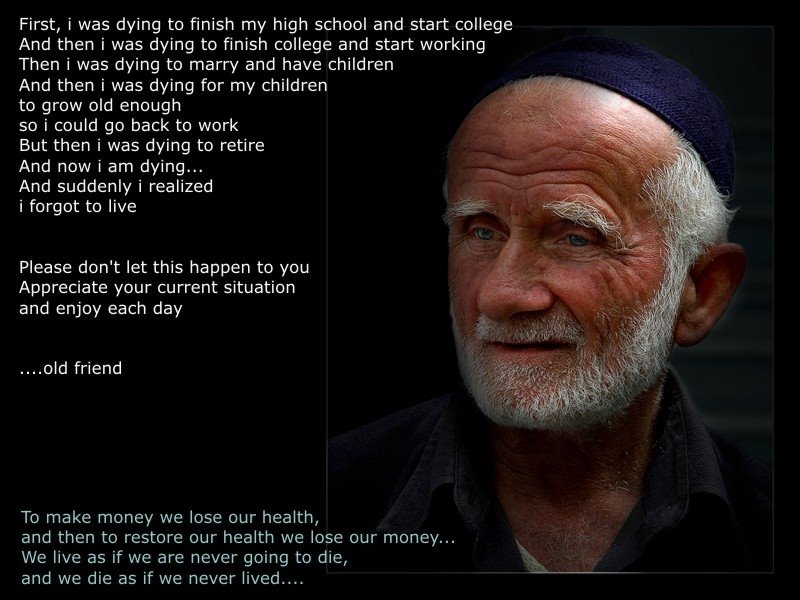Views on suicide have been influenced by cultural views on existential themes such as religion, honor, and the meaning of life. The Abrahamic religions consider suicide an offense towards God due to religious belief in the sanctity of life. In the West it was often regarded as a serious crime. Japanese views on honor and religion led to seppuku, one of the most painful methods of suicide, to be respected as a means to atone for mistakes or failure, or as a form of protest during the samurai era. In the 20th century, suicide in the form of self-immolation has been used as a form of protest, and in the form of kamikaze and suicide bombing as a military or terrorist tactic. Sati is a Hindu funeral practice in which the widow would immolate herself on her husband's funeral pyre, either willingly, or under pressure from the family and in-laws.
"Timmy!"… Tim always came when she called or needed him. He was her special friend; her only friend. The only one she would ever truly need. He knew everything about her, perfection. "I am here Steph. Is everything alright?" He appeared out of nowhere as he always did, usually behind her as he loved to make her jump in surprise. Tall and handsome with chocolate brown hair and a sly smile, he was an ideal companion. Tim was a mischievous and clever troublemaker at times, keeping her on her toes as best he could, and she loved him dearly for it. Oh, I was just lonely. Wanting some company." Today was different though. He appeared detached and edgy, as if something was greatly disturbing him. "What's wrong Timmy? What's on your mind today?" Silence Timmy wouldn't look at her, just shuffled his feet in a solemn annoyance and worry. It was odd for him, as he usually was quite the conversationalist, yet today was not the day for chit chat it seemed. "You...you are going to die." He declared abruptly with a sorrowful tone. Steph took several steps away from him in shock, not willing to believe the words he spoke. "How? Who? Why? What? Where? When?" she stammered quickly, wanting answers.
"Drowning. You will drown." He merely shook his head and refused to speak any more after. There was something he specifically did not desire to reveal, she could read it in his eyes. He was hiding a motive he could not bring himself to admit. "Well?" She stared at her feet, unsure of what to say or do. "Let's go for a walk, take your mind off things." "No water?" She questioned. "No water." A shrug eased from his shoulders as he made for the door, not waiting for her to catch up to him. She was confused by both his words and actions, especially from such a dear friend as her Timmy. Trying to push it off as just a bad day, but it wouldn't leave her alone because her Timmy never had a bad day. Fear rose to her throat as possibilities floated through her mind, causing a constant check over her shoulder to see if anyone was following them. "No one is following us, Steph. You don't need to keep checking." She bit her lip in shame, trying to hide her obvious embarrassment. Following behind him in silence, it was deathly. Every time she opened her mouth to speak, the sound and words were stolen from her as if she was speaking into a void."Where are we going Timmy?" They had walked into the patch of forest behind her house. A place they often ventured to be alone and talk together, sharing intimate secrets and passions. "Someplace, special." Still following his lead, he brought them to a dark shack a good ways from any sort of civilization. They had found it on one of the numerous walks together, finding it to be the perfect place for a hideout. Held together with a few nails and a couple of dusty windows, it wasn't much, but it was a castle to her. The most magnificent place in the world, because it was their place. Oh Timmy, what a great idea!" "Yeah, great" His attitude had not improved, and if their castle couldn't lift his spirits, she wasn't sure what could. She wrapped her arms about his waist, attempting to pull him close, but he gently pushed her away. Never did his eyes even come close to looking into hers, and she was crushed. "I'm sorry Steph. It wasn't supposed to be like this. It wasn't supposed to happen this way." A confused look spread across her features as she stood back in a corner of the shack staring at him. She didn't want to understand what his words meant, but her gut said she would find out soon enough. A hand went behind his back to retrieve something. Her eyes widened when he brought it into view, the meager light reflecting off the shiny metal surface. A sharp blade glimmered between them, causing her to freeze and her skin to crawl helplessly. "Timmy? W...what is that for?" Brown eyes stared at the object as he spun it in his fingers with great agility. The ease with which he performed the act did little to calm her nerves. He didn't answer her, only stepping towards her slowly, still unable to look her in the eyes. "It is time this dream ended, Steph. This dream has to end." She tried to run, but he grabbed her arm and twisted it behind her. A scream escaped her lips from both pain and utter terror."Your time of use has come to an end. I must move on." Tears streamed down her pale features as he spoke. She didn't understand, especially now, but he was too strong for her. If she tried to struggle, it would only cause her more pain and tighten his grip. "The time is NOW!" The blade stabbed the supple flesh of her abdomen. A gasp of surprise escaped her as the pain stole her breath. She reached out to him, to touch him, to feel him. He wasn't there. He had vanished into thin air, leaving her alone. Backing into a wall, she slipped to the floor of the shack, blood began to flow up into her mouth. It tasted horrible, but she couldn't make it go away or stop. Her body was frozen. She tried to take a deep breath, but warm liquid filled her lungs instead. I'm sorry … Timmy's voice echoed in her mind; his image blinked in and out before her. Who are you…Tim? “Your own creation...” The voice replied, just before the world went black forever…and no way or no any chance to turn back. THE END.
For thousands of years, people have wondered about the reasons behind suicide. Many theories have been put forward. No one, however, has found a complete or satisfactory answer. Each case of suicide is separate and individual, with its own complications, sorrows, and mysteries. There is no single explanation for what causes people to kill themselves. The natural end of every human life is death. Some people, for reasons that have never been fully understood, choose to end their own lives. This is called suicide, which means literally "self-killing." For all the uncertainty that has surrounded the phenomenon of suicide, his assessment of the problem is probably as accurate as any. The individual, in seemingly hopeless conflict with the world, decides to end his or her existence in what amounts to a final assault against a society that can no longer be tolerated. In so doing, the person tries to obtain a final revenge on everything and everyone that have caused their feelings of depression. Sometimes suicide has been used as a form of execution. Perhaps the most famous such case is that of the philosopher Socrates, who was required to drink hemlock to end his life in 399 BC, after being found guilty of corrupting the youth of Athens. In the 20th century the German general Erwin Rommel took poison to stop his breaths…so why not just legalize it. Modern medical technology has been able to extend life a great deal - but a longer life is not always the same as a better life. Many people are concerned that when death draws near, it will be painful, debilitating, or otherwise miserable. Some would rather die a bit sooner than face that. If a person feels that death is the only way out who is to judge their decision? If god or some other form of superior being did not want us to end our life it would not have given us a brain capable of doing so. Suicide should be legal everywhere.
Why is Suicide Wrong? While it is normal to have suicidal thoughts, suicide has a much larger physical, social, moral and emotional impact than most people ever realize. It is not wrong to feel depressed, unhappy, out of control, lost, or scared. It is not wrong to feel paralyzed in a bad situation or hopeless about the future. It is not wrong to have fleeting thoughts that things would be so much easier, if only you were not here. Feeling this way does not make you a person of weak character. Everyone deals with pain differently, and one person may come away with more intense emotions about a situation than another.
God Owns You? Most people probably think that they are somehow in charge of their life - their life and their bodies are their own responsibility. According to some theologians, however, that isn't actually the case. They argue that God owns you and, therefore, you have no right to do anything to your body or your life that God doesn't sanction. This bit of authoritarian theology is well expressed by the notorious "God Squad," who responds to a person's question about whether taking drugs qualifies as a sin: The question of whether or not using drugs is a sin (of course, in this case, we're referring to the use of illegal, addictive drugs, as well as legal, addictive drugs that are harmful to your health) depends on a bigger question: "Who owns your body?" If your answer is, "I own my body," then you ought to be able to put anything you want into your own body. You ought to be able to refuse medical treatment for your body. If you want, you ought to be able to pierce, tattoo, or mutilate your body. You even ought to be able to kill your body to commit suicide if you want to. For religions that believe in God, their version of this answer is that God owns your body because God created and sanctifies all life. You did not create your body or your life; therefore you have no right to harm your body or your life.
The Impact of Suicide, Suicide is FOREVER. You do not get to wake up. You do not get a second chance. You will not be able to say, "Wait, I want to stay." There is no turning back like. Think about the situation in grisly fact. Someone will have to find your body, and most likely it will be someone who loves and cares for you. They will bear this in their memory for the rest of their lives. If you kill yourself at someone else’s hand, such as laying in front of a car or train or forcing a police officer to kill you, know that these people will bear the brunt of the emotional turmoil and will always wish that it could have been different. There may be people standing on the sidelines, knowing that you are in pain and wishing that they could help you. These people will suffer forever in guilt, wondering if there was more they could have done or said to change your mind. They will blame themselves. The repercussions go far beyond this. Friends or family members may grow so despondent that they, in turn, take their own lives. Most newspapers will not even mention your name after death by suicide. But the best part I reckon, you or him or me… will know what life is after death, Kurt Kobain & M.J know already. I agree many religious observers believe that suicide is fundamentally wrong, so… who cares?
Life is meant to be lived and experienced. Emotional traumas can cause some individuals to give up long before the body stops breathing. The human spirit is both strong and fragile. The desire to live is instinctive in all of us at birth. It is only through tragic and extreme circumstances that some lose touch with that instinct and choose, instead, to put an end to their existence. The onset of such an emotionally tragic state of mind can often result from the sudden loss of something extremely and profoundly important to the individual. Whether it is the loss of a loved one, a career, or physical health, these losses can be overwhelming and debilitating. If the individual is unable to refocus their purpose and energies toward something that provides them with a new and meaningful purpose, depression and a loss of self can easily become dominating forces in a once, well-lived life. Depression is not only a leading cause of emotional suicide, but the behavior itself will, in turn, intensify the depression. Left untreated, this cycle can become debilitating to the point of having virtually the same consequences of physical suicide, up to and including eventual, early death.
Why Shouldn't Legalize Suicide? Under the banners of compassion and autonomy, some are calling for legal recognition of a "right to suicide" and societal acceptance of "physician-assisted suicide." Suicide proponents evoke the image of someone facing unendurable suffering who calmly and rationally decides death is better than life in such a state. They argue that society should respect and defer to the freedom of choice such people exercise in asking to be killed. But what would be the consequences of accepting this perspective? Accepting a "right to suicide" would create a legal presumption of sanity, preventing appropriate mental health treatment. If suicide become legal rights, the presumption that people attempting suicide are deranged and in need of psychological help, borne out by many studies and years of experience, would be reversed. Those seeking suicide would be legally entitled to be left alone to do something irremediable, based on a distorted assessment of their circumstances, without genuine help. An attempt at suicide, some psychologists say, is often a challenge to see if anyone out there really cares.
If society creates a "right to suicide", the message perceived by a suicide attempter is not likely to be, "We respect your wishes," but rather, "we don't care if you live or die."Almost all who commit suicide have mental health problems. Few people, if any, simply sit down and make a cool, rational decision to commit suicide. In fact, studies have indicated that 93-94% of those committing suicide suffer from some identifiable mental disorder. In one study, conducted by Dr. Eli Robbins of suicides occurring in St. Louis, Missouri. An independent British study came up with a remarkably similar total figure, finding that 93% of those who commit suicide suffer from a diagnosable mental disorder. Persons with mental disorders make distorted judgments. Suicide is often a desperate step taken by individuals who consider their problems so intractable as to make their situations hopeless. But experts in psychology recognize the evaluations these individuals make of their personal situations are flawed. The suicidal person suffering from depression typically undergoes severe emotional and physical strain. This physical and emotional exhaustion impairs basic cognition, creates unwarranted self-blame, and generally lowers overall self esteem, all of which easily lead to distorted judgments. For example, one study conducted by two psychiatrists in Seattle, Washington found 75% of the 96 suicide attempters they studied were actually quite ambivalent about their intentions to die. It is not actually a desire to die, but rather the desire to accomplish something by the attempt that drives the attempter to consider such a drastic option. Suicide is the means, not the end. Often, suicide attempters are apparently seeking to establish some means of communication with significant persons in their lives or to test those persons' care and affection. This explains why, paradoxically but truthfully, many say after an obvious suicide attempt that they really didn't want to kill themselves. Psychiatrists have long advanced the opinion that underlying a suicidal person's ostensible wish to die is actually a wish to be rescued, so that a suicide attempt may quite accurately be described, not as a wish to "leave it all behind," but as a "cry for help." To allow or assist in a suicide, therefore, is not truly fully respecting a person's "autonomy" or honoring an individual's real wishes. Depression can be treated. Alcoholism can be overcome. The difficult situations and circumstances of life which, at the moment, seem permanent and pervasive often dissolve or resolve in time. Encouraging or validating the disturb individual's feelings or misperceptions in fact make it less likely individual will get the help he or she needs and subconsciously probably wants.
What I really believe is that this knowledge is accessible through the Quran and the authentic traditions of Prophet Muhammad, may God praise him, and that it is guaranteed by the Syariah (Islamic Law). Islam establishes a legal framework, and embodies a code of ethics, designed to protect the rights of an individual including his or her right to live in a secure society. Prophet Muhammad, may God praise him, said, “Whosoever wakes up (in the morning) feeling that he is secure in his community, free from ailments and diseases in his body, and has enough provision for a single day, it is as if he owns the entire world.” (Tirmizi). The syariah is concerned with preserving five basic rights: the right to practice religion, the protection of life, the safeguarding of the mind or intellect, the preservation of honor and family, and the sanctity of his wealth and property. A unified community establishes a moral and ethical base in which individual rights are upheld. Often when discussing this commit suicide issue its relate to religion, one hears the statement that none has the right to judge anyone else’s beliefs, or that religion is a person’s private matter and we cannot say that it is wrong or right. Throughout history, societies have based their laws and ethics upon “absolute truths” which they deem to be “right”, and this is either a result of an exterior text regarded as supreme, or of the trait found in the innate nature of humans that causes them to see certain things as good and others as evil. Humans, to a limited scale, can see certain things as good and evil. For example, all humans, left to their natural state without perversion of the mind, will see feces and urine as filthy. Also, certain deeds, like stealing, killing and lying are also known to be evil, while truth, sincerity, and honor are seen to be lofty. This is a result of a trait that was created in all humans, but as mentioned above, this sense is limited. If one says that they do not have the right to judge other’s beliefs or actions, they are, in fact, contradicting themselves. If you were to ask many of these people whether killing infants or suicide is correct and acceptable, they will naturally answer that it is not. It is Allah who created the world and it is Allah who set the scales of justice. It is Allah who is perfect and it is Allah who has no faults whatsoever. And just Allah knows best.
Subscribe to:
Post Comments (Atom)










No comments:
Post a Comment